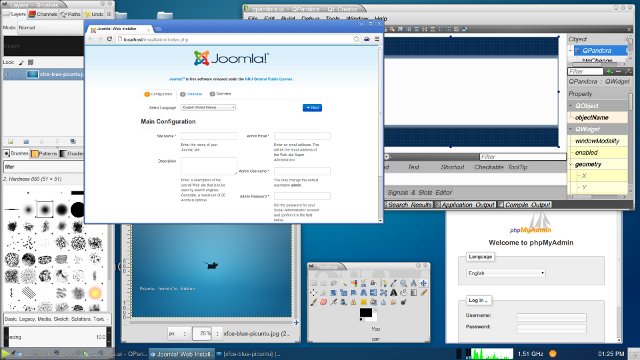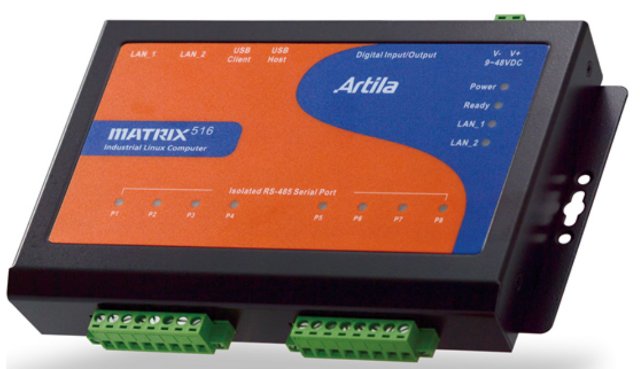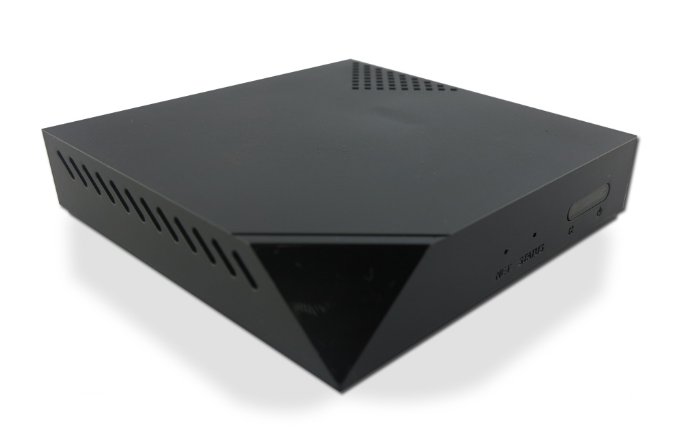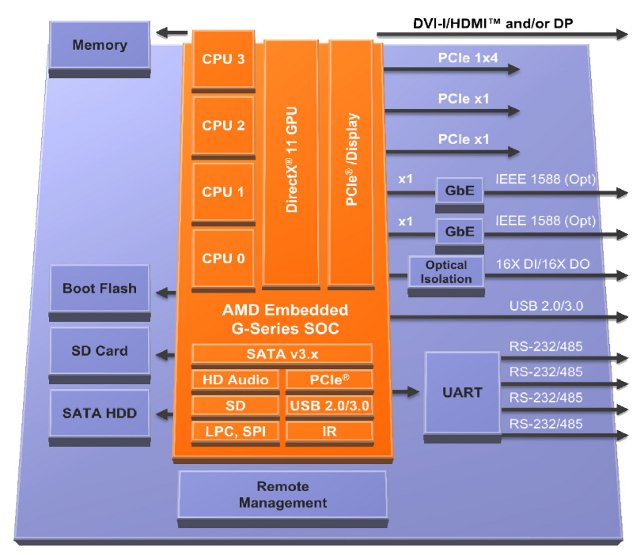In case you are wary of having drones, such as RC helicopters, quadrotors…, flying around your house and invading your privacy, DroneShield can help you detect consumers’ drones by using a Raspberry Pi, a microphone and FFTW library, a C library for computing the discrete Fourier transform. The device will capture the audio with the microphone, analyze the noise spectrum of the drone flying around, and search for an entry in a signature database, and if a match is found the device will then send an email or SMS to inform you of the “invader”. There are complex challenges to overcome, or limitations, with this method, as any background noise will affect the detection, and drone emitting little noise or flying at high altitude won’t be detected. Spectrum analyses should however help avoid false positives such as a loanmowers and leafblowers as those emit a different kind of noise.They also […]
Picuntu Home://io Edition Brings GPU Acceleration to RK3066 based Mini PCs
Earlier this year, Picuntu (RC2), an Ubuntu-based distribution, was released for RK3066 powered HDMI dongles such as MK808, UG802, etc… More work has been going on since them, and Justin Gross (JustinTime4Tea) announced the release of Picuntu Home://io edition on SlateDroid. This distribution is based on Pictuntu RC3, supports GPU hardware acceleration, and lots of packages including Quake 3. GPU acceleration has been available since February thanks to olegk0, but I think it may be the first time it’s packaged into an installation image. Justin added a lot of goodies in this image including: Gaming – PCSX_rearmed Playstation Emulator and ioquake3 (with free demo files, replace with your own original Quake3 CD files) both supporting PS3 controller. Other games include GLTron, Solitaire, B.A.L.L.Z and a few more. Web Browsers – Midori, Firefox, and Chromium with support for Flash Graphics Tools – GIMP, Scribus, Inkscape, ImageMagick, etc… Email & Messaging Clients […]
Artila Matrix-516 ARM9 Industrial Linux Computer Features 8 RS-485 Ports
Artila Matrix-516 is a Linux-based industrial computer powered by Atmel AT91SAM9G20 CPU (ARM9) with 64MB SDRAM and 128MB NAND Flash inside, and several I/O interface including 8 isolated RS-485 serial ports. This device targets industrial applications, including intelligent transportation system (ITS), building automation, energy-saving system, and factory automation. Here are the specifications of this industrial Linux computer: CPU – ATMEL AT91SAM9G20 w/MMU @ 400MHz System Memory – 64MB SDRAM Storage – 128MB NAND Flash + 2MB DataFlash for system backup (recovery boot) + micro SD socket (Up to 32 GB) Network Interface – 2 x 10/100BaseT, RJ-45 connector with 1.5KV magnetic isolation TTY(Serial) Ports 8 x isolated RS-485 (2500Vrms isolation). Connector: terminal block Baud Rate: up to 921.6Kbps Parity: None, Even, Odd, Mark, Space Data Bits: 5, 6, 7, 8 Stop Bit: 1, 1.5, 2 USB Ports – 2x USB Host Ports, 1x client port (reserved). Up to full-speed (12Mbps) […]
Linux 3.9 Release
Linus Torvalds has announced the release of Linux Kernel 3.9: So the last week was much quieter than the preceding ones, which makes me suspect that one reason -rc7 was bigger than I liked was that people were gaming the system and had timed some of their pull requests for just before the release, explaining why -rc7 was big enough that I didn’t actually want to do a final release last week. Please don’t do that. Anyway. Whatever the reason, this week has been very quiet, which makes me much more comfortable doing the final 3.9 release, so I guess the last -rc8 ended up working. Because not only aren’t there very many commits here, even the ones that made it really are tiny and not pretty obscure and not very interesting. Also, this obviously means that the merge window is open. I won’t be merging anything today, but if […]
Yocto Project 1.4 “Dylan” Release
The Yocto Project Release 1.4 has just been announced. This release codenamed “Dylan” and based on Poky 9.0.0 is the sixth release of the project. The Yocto Project is a framework that creates embedded Linux distributions, and has been getting more and more traction with silicon vendors such as Intel, Freescale and Texas Instruments. Yocto Project 1.4 bring the following new features and updates: Major performance improvements – The overall build time has been reduced by more than 10%. Kernel build time is reduced by about 25%. With rm_work enabled, 40% less storage will be used for the tmp directory. Smart, a replacement for zypper Support for read-only rootfs Wayland support, an X replacement. Systemd support, a replacement for the system V init daemon. Usability improvements to HOB, bitbake, yocto-bsp and other tools, including UI improvements, new features and bug fixes. Documentation improvement/update and a new kernel development manual and […]
Linaro 13.04 Release With Linux Kernel 3.9 and Android 4.2.2
Linaro 13.04 has just been released. It features Linux Kernel 3.9-rc7 and Android 4.2.2. A lot of work has been done on ARMv8 (Cortex A53) with further work on OpenEmbedded, more testing, and updates to the GCC toolchain. Calxeda EnergyCore server has been added to LAVA, Origen Quad now gets hardware video acceleration in Android Jelly Bean. Still more cleanup has been done on the kernel side with regards to Samsung and ST SoC, and a big.LITTLE porting guide is now available (linaro login required). Here are the highlights of this release: LAVA Prototype of a new publishing system is used to overcome performance problems with android-build.linaro.org. Calxeda EnergyCore support is merged in LAVA, and an isolated system has been set up for web benchmarking. Fedora support is merged in LAVA. A user can submit LAVA jobs using a Fedora pre-built image. Boot commands are untangled from LAVA dispatcher. They’re now […]
100 Euros “Little Black Box” Runs XBMC Linux
Most set-top boxes running XBMC, are actually Android devices running XBMC as an app, and I don’t know of other media players that are sold with XBMC Linux pre-installed. Until today, as an XBMC Linux STB called The Little Black Box has been officially announced today. This XBMC device is powered by AMLogic AML8726-M3 @ 1 GHz, and comes with 1GB RAM, 4GB Flash, HDMI and AV output and more. Little Black Box hardware specifications: SoC – AMLogic AML8726-M3 ARM Cortex A9 @ 1GHz + Mali-400 GPU System Memory – 1GB RAM Storage – 4GB NAND Flash Video Output – HDMI (1080p) and composite Connectivity – 10/100M Ethernet + 802.11 b/g/n Wi-Fi USB – 2x USB host ports Weight – 500 g Dimensions – 10 x 10 x 3 cm The package will come with the box, a dual sided RF remote with a qwerty keyboard and standard remote buttons […]
AMD Unveils AMD G-Series SoCs For Embedded Applications
In 2011, AMD launched the G-Series APUs (Accelerated Processing Unit) that combines the CPU and GPU into one chipset which then connects to a controller hub to handle I/Os, and recently the company announced AMD G-Series SoC at Design West 2013. The new solution combines a “Jaguar” CPU, a Radeon HD8000 series GPU and a controller hub into one and only SoC, further integrating functions. Both AMD G-Series APU and SoC target embedded systems such as industrial control and automation, digital signage, electronic gaming systems, SMB storage, IP-TV, medical and network appliances, set-top boxes and more. AMD claims G-Series SOCs offer up to 113 percent improved CPU performance compared to G-Series APU, and up to a 125 percent advantage compared to the Intel Atom (Dhyrstone, EEMBC CoreMark). The platform also includes support for DirectX 11.1, OpenGL 4.2x and OpenCL 1.2 yielding up to a 20 percent graphics improvement over G-Series […]








